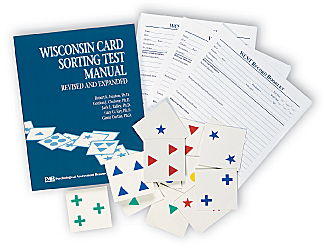| ||||||||
|
| |||||||||||||||||||||||||||||||||||||||||
The WCST was originally developed to assess abstract reasoning and ability to shift cognitive strategies in response to environmental changes. Over the years, it has gained popularity as a clinical neuropsychological instrument. Unlike other tests of abstraction, the WCST provides objective measures not only of overall ability, but also of particular sources of difficulty–e.g., inefficient initial conceptualization, perseveration, failure to maintain set, and inefficient learning across several stages of the test. In addition, it is one of the very few tests that have shown specific sensitivity to brain lesions involving the frontal lobes. Accordingly, it can be very helpful in discriminating frontal from nonfrontal lesions.
The test uses stimulus and response cards that show various forms in various colors and numbers. Individually administered, it requires the client to sort the cards according to different principles (i.e., by color, form, or number). As the test progresses, there are unannounced shifts in the sorting principle which require the client to alter his or her approach.
In the past, as many as 32 different sorting methods have been used to administer the WCST. The Test Kit offered here, however, includes a revised and expanded Manual with explicit instructions for standardized administration and scoring. This Manual reviews previous research with the WCST, presents demographically corrected normative data from 899 subjects aged 6.5 to 89 years, and provides essential interpretive and diagnostic guidelines. Reliability and validity information is also included, along with data from child and adolescent populations. In addition, the WCST Record Booklet now provides space for recording demographic and referral information as well as raw scores, percentiles, T-scores, and standard scores.
This complete standardization enhances the clinical value of the WCST, an already highly useful measure of abstract reasoning ability and neuropsychological impairment.
Component
KIT: Includes all Test Materials; 50 Record Booklets; 1 Manual




